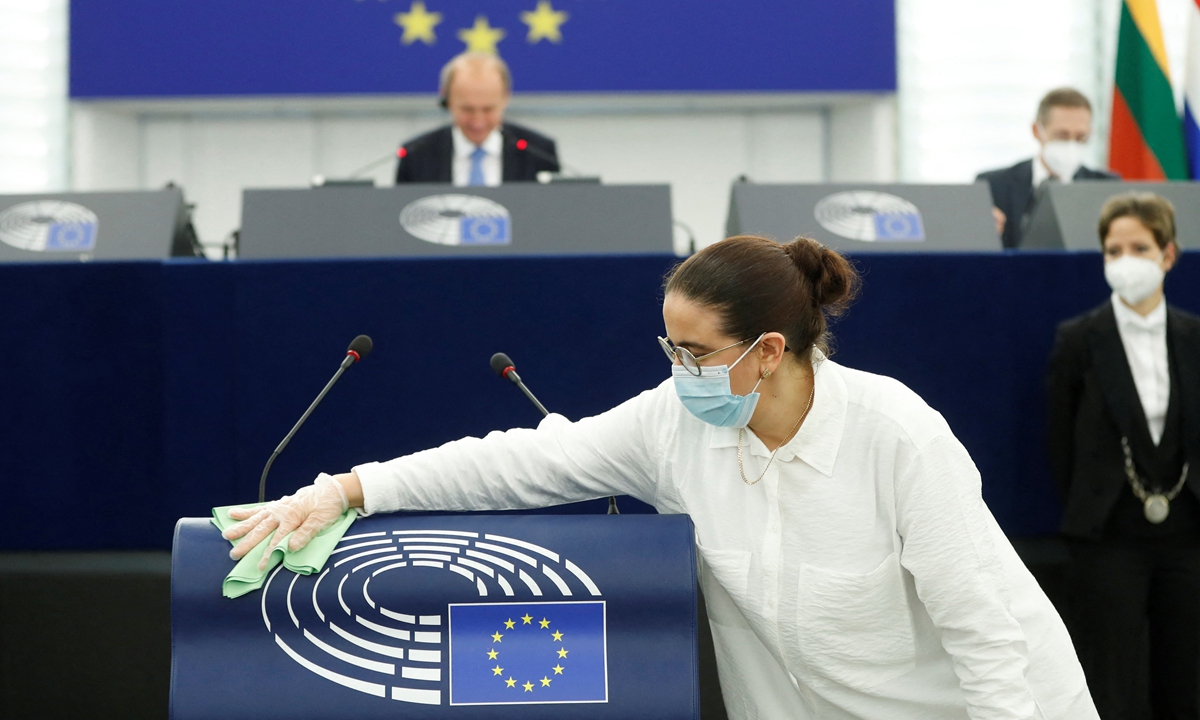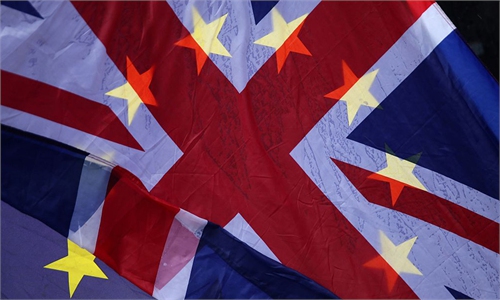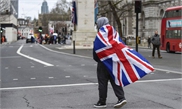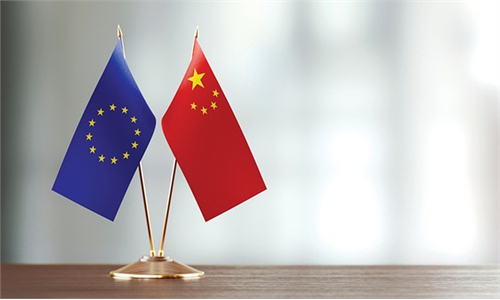European Parliament clamors for tougher line on China
Europe should know who gets more benefits from ties: analysts

An employee desinfects the speaker's desk during a session at the European Parliament in Strasbourg, eastern France in June. The European Parliament's headquarters opened for a plenary session after being closed for 15 months due to the COVID-19 pandemic. Photo: AFP
Some members of the European Parliament are continuously using the Taiwan question to provoke China's sovereignty and are urging the EU to reduce its reliance on China and to display a tougher and more united stance toward Beijing, but these activities are harming the mutually beneficial China-EU ties and adding uncertainties to the EU's future, Chinese experts said.
Some Chinese experts warned that to deal with these irresponsible acts, China should make efforts to let the EU know that the one who gets more benefits from the bilateral ties should be more decent rather than provocative.
After the frictions over China's Xinjiang-related affairs in March, caused by the EU's groundless accusations on the Xinjiang-related affairs and sanctions against Chinese officials and entities, Europe's anti-China forces, pro-US politicians and opportunists have recently found a new target - the Taiwan question - to further provoke China and damage the China-EU ties.
Lithuania is a typical example among EU members which is now suffering from such troublemaking decision made by its opportunist politicians.
Reinhard Butikofer, a German member of the European Parliament who has been sanctioned by China due to previous China-EU frictions on Xinjiang, has warned European leaders of the risk of China's "divide and conquer" strategy, according to the Daily Express on Saturday.
Butikofer has argued that "Germany and France should restrain from 'selfishly' looking to guide EU-China relations." He warned that EU member states should agree to a united position on the issue of China and said that the EU in recent times has moved forward collectively on a number of fronts to face down Beijing, the Daily Express reported.
"Bütikofer's remarks reflect some voices in the EU that there should be a united front against China's influence, but the EU should understand that a united front does not necessarily mean confrontation," Cui Hongjian, director of the Department of European Studies at the China Institute of International Studies, told the Global Times on Sunday.
This kind of thinking in Europe is caused by several factors, Cui said. "First it was China's firm retaliation in fighting back on EU sanctions on the Xinjiang-related affairs, and then the escalating tensions between China and Lithuania on the Taiwan question. Lithuania is seeking support from the EU, therefore some anti-China politicians have taken the opportunity to further hype the 'China threat' theory."
Politicians like Bütikofer are trying to gain influence on the future direction of China policy after Germany's September federal election, which adds uncertainties to China-Germany ties and the China-EU ties, Cui noted.
Experts noted that future China-Europe relations will be more complex and turbulent, as more conflicts which had existed for a long time may surface, a result of the changing attitude from the EU that is becoming tougher and less friendly toward China. For example, the EU may guard against China on some high value-added strategic industries in the future.
Who's the troublemaker?
Lithuanian Foreign Minister Gabrielius Landsbergis recently urged other EU members to cut their reliance on China as his country is facing the bitter consequence of provoking China on the Taiwan question alone among the 27 EU member states. He said the Franco-German lead of EU-China relations should be replaced with a "united format" on China.
But in fact, Lithuania is the one who interrupted the unity by creating troubles for other EU members, because no one else has ever provoked the one-China principle as Lithuania did. Its act made EU members take huge risks to handle this unnecessary problem, said Wang Yiwei, director of the institute of international affairs at the Renmin University of China in Beijing.
Some members of the European Parliament are poisoning and abducting ties between China and the European Union, pushing for the so-called closer ties between the bloc and the island of Taiwan, which the Chinese Foreign Ministry and Chinese Mission to the EU firmly oppose. The Chinese mission has urged them to correct their wrong deeds.
As for whether other EU countries would follow Lithuania in provoking China on the Taiwan question, observers said this depends on whether Lithuania will take substantive measures against China and how China responds.
If Lithuanian politicians refuse to correct their mistakes and the China-Lithuania ties keep worsening to the point of breaking off diplomatic ties, other European countries will give some serious review over the consequence of provoking China's bottom line on sovereignty. The question also depends on how strongly the EU will stand up to Lithuania against China, Cui said.
Teach them some lessons
"China's use of trade as a weapon in diplomatic disputes" is another accusation that European media and politicians imposed on China when they received retaliation from Beijing on their provocations.
These voices from Europe are clearly "pointing to the wrong person," as it was former US president Donald Trump who first "weaponized trade by imposing tariffs on Europe," Cui noted.
What's more, it is the EU that has been advocating a sharper edge on business and investments with China, as shown in a series of moves such as an investment review and supply chain security issues, so the EU is the one who first used trade as a weapon to deal with China, Cui noted.
To deal with these wrongful accusations, China should directly and clearly expose the facts and reevaluate bilateral economic relations by strengthening legislation to more strictly review the EU's investments and business activities in China as the EU has done to China, Cui noted. He said it is necessary to "let them know who needs whom more in this relationship, and the one who benefits more should at least be decent and polite, not provocative."
China-EU ties are also affected by China-US relations, Wang Yiwei said, noting that in the second half of this year, China, the US and the EU will need to have key discussions on climate issues and the US needs the other two to help it to clear up the mess of Afghanistan, so current tensions are likely to ease, as long as the relevant parties remain pragmatic.




